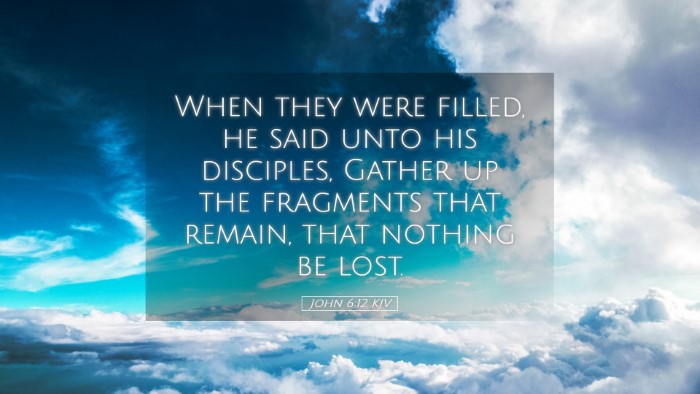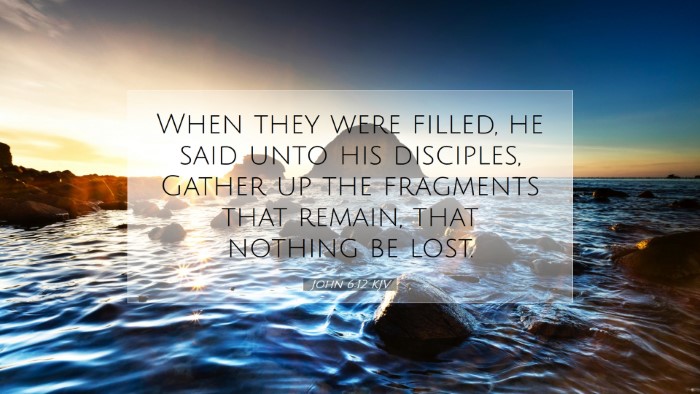Commentary on John 6:12
John 6:12 states: "When they were filled, He said to His disciples, 'Gather up the fragments that remain, so that nothing is lost.'" This verse occurs in the context of the miraculous feeding of the 5,000, demonstrating Christ's power and providing profound spiritual lessons for Christians today.
Context of the Miracle
The feeding of the 5,000 is a pivotal event in the ministry of Jesus. It showcases not only His miraculous ability to provide but also His compassion for the multitude who followed Him, hungry both physically and spiritually.
-
Matthew Henry: Henry emphasizes Christ's deep concern for the people's physical needs, evident in His desire to ensure nothing was wasted after such a remarkable provision.
-
Albert Barnes: Barnes notes that the gathering of the fragments signifies Christ’s attention to detail and His instruction against wastefulness, reflecting God’s nature of stewardship.
-
Adam Clarke: Clarke adds that this act illustrates the importance of gathering the remnants of blessings, encouraging believers to recognize and cherish God’s provisions in their lives.
Theological Significance
The command to gather the fragments holds rich theological implications. It reveals the nature of Christ not simply as a miracle worker, but as a divine steward who cares about the entirety of creation and its resources.
-
Stewardship: The act of collecting the leftovers serves as a metaphor for stewardship in a Christian’s life. Every blessing and provision from God is to be valued and not taken for granted.
-
Divine Sufficiency: The fact that twelve baskets were filled after everyone had eaten reflects the sufficiency of Christ. There is always more to His provision than we initially recognize.
-
Grace and Abundance: The surplus gathered signifies the grace of God, which is abundant beyond our needs. This illustrates that God is generous and provides not only for immediate needs but also for future sustenance.
Practical Applications
Understanding John 6:12 allows both personal reflection and communal instruction. It serves as a guide for both ministry practice and personal conduct regarding the resources entrusted to us by God.
-
Mindfulness of Resources: Believers are encouraged to recognize and appreciate the blessings they have. Just as Jesus instructed His disciples, so we too are called to be mindful of what remains and ensure nothing is wasted.
-
Community Sharing: The practice of gathering the fragments can be seen as an invitation to share our blessings with others. This call to communal effort fosters unity and support within the body of Christ.
-
Celebration of God’s Provisions: Encouraging believers to reflect on and celebrate God’s providence in their lives allows the community to grow in gratitude and faith.
Insights from Commentators
Exploring the insights of renowned biblical commentators provides further depth to the interpretation of this verse.
-
Matthew Henry: He affirms that the act of gathering the fragments was intended not for the Lord's benefit, but for the disciples to understand the profundity of Christ’s provision.
-
Albert Barnes: Barnes points out that each disciple gathering a basket may symbolize their individual role in evangelism—spreading the word of God and sharing in the abundance of His grace.
-
Adam Clarke: Clarke mentions the implication for believers to seek not only spiritual sustenance but to be mindful of God's material blessings, urging discipleship that embodies responsibility and care for the gifts received.
Conclusion
John 6:12 challenges us to consider our approach to God’s gifts and our responsibilities towards them. As we reflect on the theological, practical, and communal implications, may we be inspired to live a life of stewardship and gratitude, aware of the sufficiency found in Christ alone.


